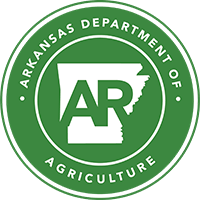Plant Industries
Serving the citizens of Arkansas and the agricultural and business communities by providing information and unbiased enforcement of laws and regulations set by the Arkansas State Plant Board
Agriculture / Plant Industries / Regulatory Section / Quarantines
Quarantines
A geographic area established to prevent the spread of a new pest, weed, or plant disease. Regulated items can only leave the quarantine area after being treated or handled in a manner which prevents the movement of the pest, and must be accompanied by documentation of the treatment (see circular 11 below for regulations). Quarantined items can move freely within the quarantine area.
Emerald Ash Borer Quarantine
EAB is an exotic Asian beetle, first discovered in the United States in 2002, in Michigan. The adult beetles are emerald green (pictured at right), while larvae are white-to-cream colored. These beetles feed on and destroy ash trees. Evidence of EAB damage has been discovered in Arkansas, as of early summer of 2014. Officials suspect the EAB has a one-year life cycle in the Arkansas climate. It is suspected that human transportation of the beetle (through movement of firewood and/or ash items through industry-related transport) is quickest way for it to travel, state-to-state.
Due to the expanded range of Emerald Ash Borer (EAB) infestation sites within Arkansas, the Arkansas Department of Agriculture has approved a statewide quarantine for ash items as of March 27, 2018. Regulated articles can be moved within the state, but cannot move outside of the state without complying with the federal EAB regulations.
Quarantined items continue to include firewood of all hardwood species, and the following ash items: nursery stock; green lumber with bark attached; other material living, dead, cut or fallen including logs, pulpwood, stumps, roots, branches, mulch and composted/un-composted chips (1 inch or greater). Firewood is the only quarantined item that relates to all hardwood; all other quarantined items are relative to ash, only. Quarantined items can move freely within the quarantined area. The restrictions only apply to the movement of items listed within the quarantined counties to areas outside of them.
Trapping for EAB in Arkansas was first initiated in 2010 by the Department of Agriculture Regulatory Services department, the Arkansas Department of Agriculture Forestry Commission, United States Department of Agriculture (USDA), Animal Plant and Health Inspection Service (APHIS), Plant Protection and Quarantine (PPQ), and University of Arkansas at Monticello. EAB was first detected in six counties (Hot Spring, Clark, Dallas, Nevada, Ouachita, and Columbia) in 2014. A quarantine was then enacted for those counties and a buffer zone in the surrounding counties.
Since then, EAB was detected in 18 counties, including: Bradley, Calhoun, Clark, Columbia, Drew, Dallas, Garland, Hempstead, Hot Spring, Lafayette, Montgomery, Nevada, Ouachita, Pike, Randolph, Union, Cleveland, and Saline.
To help battle the infestation of EAB, many state departments of agriculture including Arkansas are releasing biological control agents/ parasitoids. The parasitoids were produced and supplied from the USDA APHIS PPQ EAB Parasitoids Rearing Facility in Brighton, MI. For parasitoid information please call 866-322-4512.
Contact the Arkansas Department of Agriculture for full quarantine details at: 501-225-1598 or eab@agriculture.arkansas.gov
- Federal Map of National EAB Quarantines
- Emerald Ash Borer Fact Sheet, by UAEX
- Emerald Ash Borer Identification Card (163 KB)
Imported Fire Ant Quarantine
Since their arrival from South America in the 1930’s, imported fire ants (IFA) have been steadily marching northward. Fire ants have a powerful sting and can harm people and animals, and can cause damage to electrical equipment. Like many other exotic invasive species, they can quickly exploit their new environment and replace native ant populations. The ants have wings during their reproductive phase and can fly up to a few miles, depending on the winds. However, they are usually spread through artificial means by movement of infested articles, including potted plants, ball and burlap plants, grass sod, hay, straw, pine straw, soil and mulch.
Most of the Southeastern United States including the southern half of Arkansas is under a quarantine for movement of IFA regulated materials. Consult the IFA map (below) for the areas under the quarantine and Circular 11 (above) for regulations. Whenever plants (with soil), grass sod, hay, straw, mulch, or dirt-moving equipment leave the quarantine area they must be free of fire ants. The quarantine applies to the following:
- Nurseries in the quarantine area shipping plants with soil outside the quarantine area.
- Landscapers and nurseries picking up plants in the quarantine area and bringing them outside of the quarantine area.
- Landscapers and nurseries within the quarantine area that are moving plants from the quarantine area for landscaping jobs outside of the quarantine area.
- Grass sod growers in the quarantine area shipping sod outside the quarantine area.
- Landscapers bringing sod from the quarantine area to outside the quarantine area.
- Bailed hay and straw which is shipped from the quarantine area to outside the quarantine area.
USDA Animal Plant Health Inspection Service – Plant Protection and Quarantine (APHIS-PPQ) and the Arkansas Department of Agriculture maintain IFA Compliance Agreements which deal with businesses moving regulated products outside the quarantine. Nurseries, sod farms, landscape contractors, and hay/straw producers that are under a compliance agreement consent to treat their plants with an insecticide labeled for IFA before they ship their plants or sod, or they agree to certify that their business and stock are free of fire ants. The compliance agreement usually has several treatment options and outlines the appropriate chemicals and concentrations to use. Hay and straw producers under a compliance agreement consent to handling and storage of their hay/straw in an approved manner to prevent movement of fire ants in their hay/straw. There is no chemical treatment for fire ants in hay and straw. Products which fall under compliance agreements should have a USDA quarantine stamp on the invoice. This shield-shaped stamp is issued when a business enters a compliance agreement and has a number which is unique to the business.
Any business violating the quarantine, either by violating a compliance agreement, or moving an untreated regulated product outside of the quarantine can be subject to a state or federal fine. Depending on the severity of the violation these fines can reach several thousand dollars.
Contact Paul Shell if you feel that your business needs to be placed under a compliance agreement, or if you want full quarantine details at: 501-225-1598 or paul.shell@agriculture.arkansas.gov

Guava Root Knot Quarantine
Guava Root Knot, Meloidogyne enterolobii
Quarantine
The Guava Root Knot Nematode, Meloidogyne enterolobii, (GRKN) was originally identified in China in 1983. Over the next 20 years this nematode was reported from several African, Asian, South and Central American countries, and in 2001 it was first reported in the continental U.S. in Florida. Since that time the GRKN has been reported in several regions along the Atlantic coast in North and South Carolina. Because of the damage it can cause to the roots of susceptible host plants, GRKN is considered a major economic pest of many horticultural and agronomic crops. It is particularly problematic because this nematode can reproduce on and damage crop cultivars that are considered resistant to other root-knot nematode species. Examples of outright crop failures have been documented due to the GRKN, particularly in crops like sweet potato that depend both on quality as well as yield for success. Other susceptible crops of interest to Arkansas growers include soybean, cotton, many cucurbit vegetables (cucumber, squash), tomato, pepper, eggplant, Irish potato, and southern peas.
In 2018 the GRKN was accidentally introduced into northeastern Louisiana near the Arkansas state border on sweet potato roots from North Carolina. This introduction illustrates just how easily non-native pests can move from one point to another. The GRKN reproduces at a very high rate and can go from low levels to severe infestations in only a year or two.
GRKN poses an imminent threat to the health and welfare of Arkansas’ sweet potato, cotton, soybean, nursery, and vegetable industries. The natural dispersal of GRKN is limited to very short distances. However, without quarantine restrictions, GRKN can spread through human assisted means over long distances through GRKN infested sweet potatoes, nursery stock, and commercial farm equipment.
The Arkansas Department of Agriculture recognizes the potential for the Guava Root Knot Nematode, Meloidogyne enterolobii, to be introduced into the state. Additionally, the Board has determined that the potential introduction of the GRKN into Arkansas can be reduced by implementing a quarantine.
Under Authority of A.C.A. 2-16-201 through 214 & A.C.A. 2-16-301 through 310 the Board has promulgated Regulations on Plant Diseases and Pests in which it has declared Root Knot Nematodes to be a public nuisance, including anything infected, infested or contaminated therewith. Pursuant to the referenced law and regulations, the following quarantine shall be implemented with regard to the Guava Root Knot Nematode:
Quarantine Areas
The GRKN in all of its life stages; host plant parts, specifically sweet potatoes from Louisiana, Florida, North Carolina, and South Carolina that can harbor the guava root knot nematode; soil from the above-mentioned quarantined states that may harbor the guava root knot nematode; commercial planting and/or harvesting equipment from the above-mentioned quarantined states.
Certified seed sweet potatoes may be moved into the state from the quarantine area under a Special Permit issued by Arkansas Department of Agriculture.
Host nursery crops may not be moved into the state from the quarantine area, whether direct from said area or by diversion or re-consignment from any other point, unless each shipment or lot is accompanied by a certificate or phytosanitary certificate issued by the regulatory agency of the state, certifying the material to be free from guava root knot nematode.
Any other article, product, or means of conveyance not listed in this Section may be designated as a regulated article if an inspector determines that it presents a risk of spreading guava root knot nematode and notifies the person in possession of the article, product, or means of conveyance that it is subject to the restrictions of the regulations.
The commercial equipment being moved is accompanied by a state of origin certificate issued by the state regulatory agency.
Uprooted vegetative cuttings of sweet potato plants may be shipped into Arkansas from quarantined areas if they are free from roots and soil and accompanied by either a certificate or phytosanitary certificate issued by the state regulatory agency certifying that the material is free from roots and soil.

